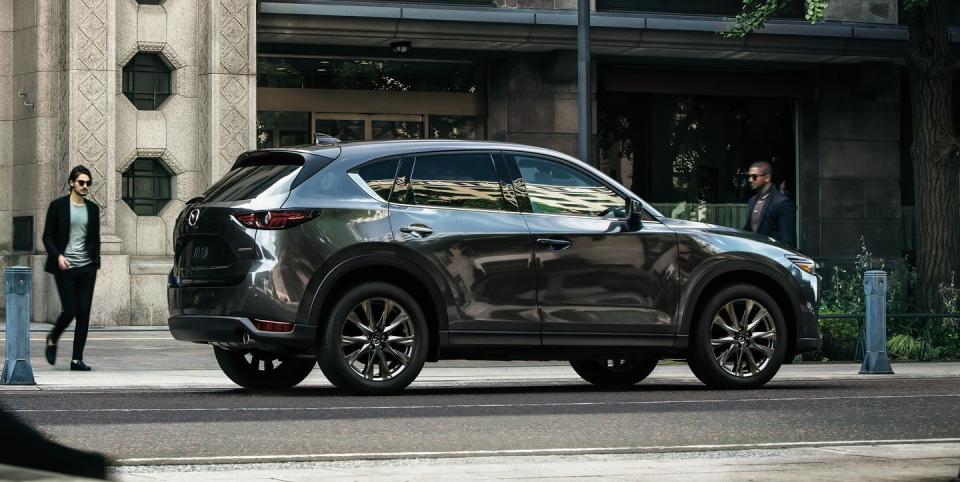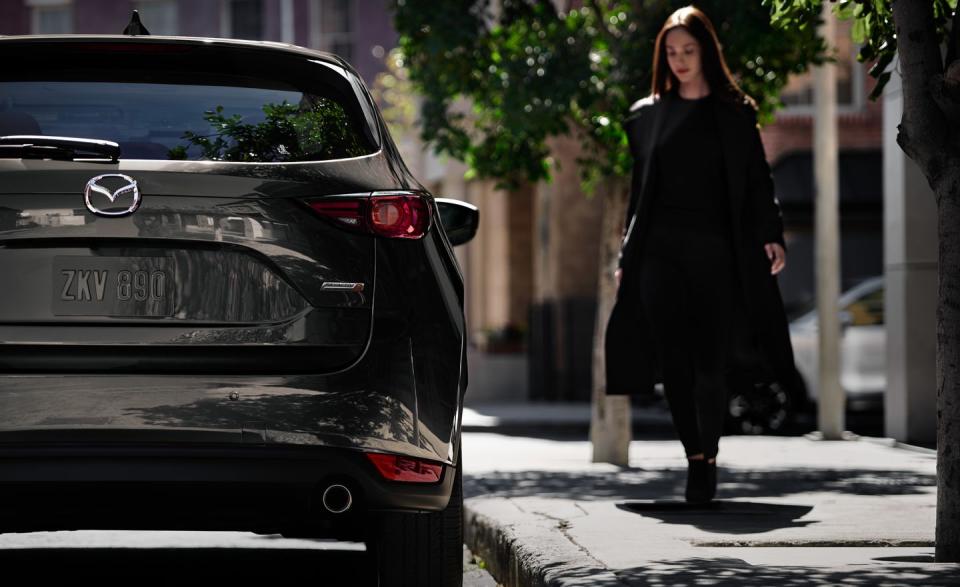The 2019 Mazda CX-5 Diesel Is Finally Here—but Is It Impressive Enough?

Mazda's talk of bringing a diesel engine to the United States was starting to feel like that friend of yours who insists he has a girlfriend, but whose girlfriend totally, definitely sounds made up. It'd be great, Mazda said, back in 2010, to have a new diesel that's efficient, powerful, and able to pass stringent emissions standards without a costly exhaust aftertreatment system. The idea sounded gorgeous, but for nearly a decade its execution has proved elusive.
After years of delays, games of musical vehicle applications (it'll be in a Mazda 6-no, wait, a CX-5!), not to mention the chilling effect of Volkswagen's sprawling emissions-cheating scandal, Mazda's diesel flame is finally real-even if it's not quite the stunner Mazda originally made it out to be. Yes, the brand will sell a diesel-powered vehicle in the United States this year (the excellent 2019 CX-5 crossover is the first to get the long-promised engine), but getting that diesel to market appears to be just about the only target Mazda has actually hit here.

The 2.2-liter diesel-fed Skyactiv-D four-cylinder engine powering that CX-5 has drifted far from the moonshot promises Mazda has made-and changed-since 2010. It's neither particularly efficient nor particularly powerful, and it relies on a urea injection system to clean up its emissions enough to pass muster. Mazda surely believed, back then, that its diesel could achieve the enviable goals of gas-engine-rivaling power, exceptional fuel economy, and clean emissions without relying on exhaust aftertreatment equipment. After all, Volkswagen had done just that with its cult-popular TDI diesel models.*
*As it turns out, Volkswagen had not actually achieved the technologically challenging goal of delivering gas-engine-rivaling power, exceptional fuel economy, and clean emissions without relying on exhaust aftertreatment. Instead, it cheated on emissions tests, a mistake that blew up in spectacular fashion when the fraud was uncovered in 2015.
While Mazda likely will never go on the record and say it realized an aftertreatment-free, emissions-compliant diesel with decent drivability wasn't possible only after Volkswagen's epic diesel fiasco, it doesn't really matter. The automaker could have figured it out on its own. Either way, you need only to know that the 2.2-liter diesel engine eventually needed aftertreatment to make it to U.S. dealerships.
Engine Specs Are Disappointing . . .
Harder to explain is why the engine only makes 168 horsepower and 290 lb-ft of torque, two figures that trail those of the gasoline-fueled turbocharged 2.5-liter four that is also offered in the CX-5. (A naturally aspirated 180-hp 2.5-liter four is standard.) The real humdinger is that the diesel's torque figure fails to match that of Mazda's turbocharged 2.5-liter engine; diesels are renowned for their torque and typically produce less horsepower (thanks to their lower peak engine speeds) but much greater torque than their gas-fueled counterparts.
The CX-5 diesel's EPA-estimated fuel economy presents another letdown: At 28 mpg combined, the diesel (which only comes with all-wheel drive) only beats its gasoline-fed siblings by a few miles per gallon. (The all-wheel-drive CX-5 with the base engine nets a 26-mpg combined estimate from the EPA, while the AWD CX-5 with the available turbo engine earns a 24-mpg label value.) In fact, if you opt for the base engine without all-wheel drive, the CX-5's EPA-estimated combined fuel economy is the same 28 mpg as the diesel's, while its 31-mpg highway fuel economy beats the diesel's by 1 mpg.
Still, the CX-5 diesel represents the most efficient all-wheel-drive CX-5 you can buy, if barely. And it's absolutely creamed by the diesel-powered Chevrolet Equinox and GMC Terrain, both of which post 32-mpg combined EPA figures and nearly 40-mpg highway numbers.
For now, Mazda is allocating the diesel engine only to CX-5s in range-topping Signature trim. Pricing is set to begin at $42,045, which is both steep and likely well chosen. After all, the brand enjoys strong demand for its pricier trim levels-and given how diesels are likely to be known about and demanded by a selective, premium buyer, bundling the 2.2-liter Skyactiv-D engine with the leather-lined, beautifully appointed Signature model seems like the right move. Granted, for those unimpressed by the CX-5 diesel-we cautiously count ourselves among that lot, at least until we drive one-there's still the classy CX-5 Signature with the smooth, torque-rich turbocharged gas engine. It starts at $37,935.
('You Might Also Like',)

 Yahoo Autos
Yahoo Autos 